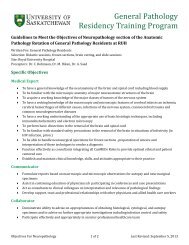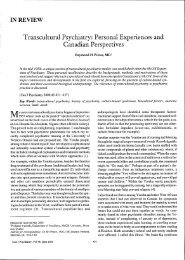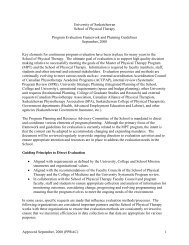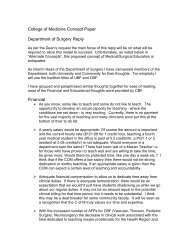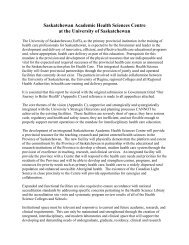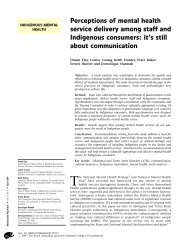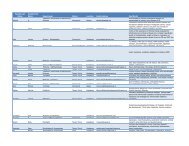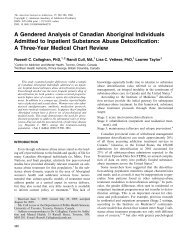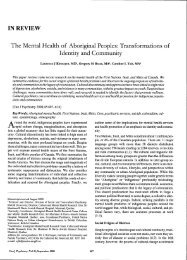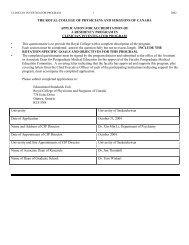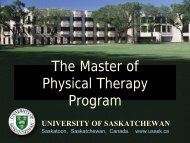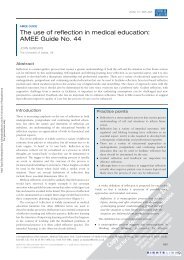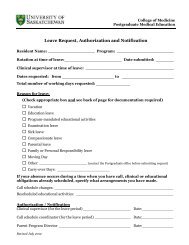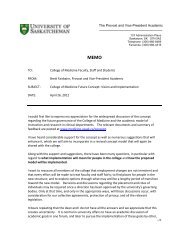Your Career Navigator, Issue 4 - College of Medicine - University of ...
Your Career Navigator, Issue 4 - College of Medicine - University of ...
Your Career Navigator, Issue 4 - College of Medicine - University of ...
You also want an ePaper? Increase the reach of your titles
YUMPU automatically turns print PDFs into web optimized ePapers that Google loves.
<strong>Your</strong> <strong>Career</strong> <strong>Navigator</strong>, <strong>Issue</strong> 4http://www.medicine.usask.ca /education/careerQUOTES OF THEMONTHThe future belongsto those who believein the beauty <strong>of</strong> theirdreams.- Eleanor RooseveltIt is much moreimportant to knowwhat sort <strong>of</strong> patienthas a disease thanwhat sort <strong>of</strong> disease apatient has.- Sir William OslerThe art <strong>of</strong> medicine isin amusing a patientwhile nature affectsthe cure.- Voltaire<strong>Career</strong> Development CornerRESIDENT CAREER DEVELOPMENTBy Vern Bennett, MD, FRCPCResidency Program DirectorPsychiatry, U <strong>of</strong> S“By believing passionately in something that does not yetexist, we create it. The nonexistent is whatever we have notsufficiently desired”.- Nikos KazantzakisResident career development provides tangible and intangible rewards forresidents, the faculty engaged in residency education and our province. TheRoyal <strong>College</strong> standards for Residency training programs and the associated roleresponsibilities set out for residency training committees sets the stage to designeffective and integrated career counseling strategies as early as PGY1. Althoughstandards and role responsibilities maintain some degree <strong>of</strong> motivation forestablishing strategies to assist residents with career development, other factorsare equally and arguably <strong>of</strong> greater significance.Paul J Myers writes, “Communication – the human connection – is the key topersonal and career success”. A department searching for an enriched careerguidance process may first need to examine their existing communicationstrategies and level <strong>of</strong> collaboration with the resident and their family. It istherefore, partly through deliberate design, yet significantly complementedby the prevailing teaching and clinical practice milieu within the Department<strong>of</strong> Psychiatry, from which emerge several fundamental principles for guidingresident career development.• The majority <strong>of</strong> teaching faculty manifests a genuine interest in the careeraspirations <strong>of</strong> residents; a level <strong>of</strong> engagement that is guided, at least in part, bythe principles embodied in mentorship.• The Department <strong>of</strong> Psychiatry acknowledges that the most efficient approachto address Psychiatry resource needs in Saskatchewan is through the retention <strong>of</strong>Saskatchewan graduates.• Subspecialty interests are identified early during the resident’s trainingexperience and tangible support is provided by fostering elective choices,selective rotation design, and securing fellowship sponsorship.• The new Specialty Training Requirements (2008) created the imperative toaddress critical resource deficiencies in clinical areas such as consultation liaisonpsychiatry, geriatric psychiatry, child psychiatry, and psychiatric practice withexpertise in different psychotherapy modalities.



